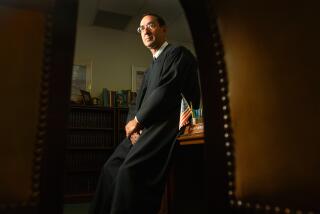A Lone Holdout Doesn’t Stand a Chance on a Jury
- Share via
Last November, I supplied the 12th vote to convict a man of kissing a teenager. That was after telling my fellow jurors I couldn’t do it.
I thought the prosecution was harsh, cruel and a waste of public resources. I quickly learned that a juror who bucks the majority in a criminal trial comes under tremendous pressure to conform, not only from fellow jurors but from the system itself.
A judge can issue a “dynamite” order, sending a divided jury back to deliberate with instructions intended to blast the holdout juror into line with the reasoning of the majority. And the California Supreme Court has ruled that jurors who follow their consciences rather than a judge’s instructions can be thrown off juries in the midst of deliberations.
Carried out in secret, behind locked doors, jury deliberations are mysterious and unknowable to all who haven’t participated. Jurors too are kept in the dark, ignorant of any aspect of a case that isn’t offered as evidence, forbidden to research the law or discuss what they hear until instructed by the judge.
In a recent and especially tragic case, a federal judge in Santa Ana sequestered jurors in a hotel and stripped them of cell phones, televisions and other news sources so they wouldn’t learn that one of two defendants in a bankruptcy fraud case had committed suicide. Jurors convicted the remaining defendant, the wife of the dead man, the next day.
In my case, the defendant was charged with lewd and lascivious acts on the body of a minor. As we opened deliberations, I found myself alone in being amazed that he was prosecuted simply for “making out,” fully clothed, with a teenager for 10 minutes--under a law so obscure that it took four days in court for us to learn what it was.
True, the difference in their ages was startling. He was 31, still living with his mom and attending community college. She was 15 years and 10 months old, a heavyset girl who could have seemed older. They met through friends.
We learned that it’s a crime in California to touch a 14- or 15-year-old with the intent of arousing passion if the person doing the touching is at least 10 years older.
If we believed the evidence--including the defendant’s taped admission of the necking--we had to vote guilty, the judge told us. The teen’s consent was not a defense and neither was the defendant’s apparent ignorance of her age.
“There isn’t much to discuss,” concluded one of my fellow jurors as we began deliberations. Eleven hands shot up for a vote of guilty.
I countered that I didn’t think the case should have been prosecuted in the first place.
“Look, this is a ridiculous case,” said another juror, “but it’s before us. We’re sworn to uphold the law and we have no choice.”
Time dragged as other jurors--graciously, incredulously, then contemptuously--disputed my view. Ultimately, I switched to “guilty” because I didn’t think I had a right to block their good-faith efforts to carry out the law.
Barring some appeal, the defendant will have to register for the rest of his life as a sex offender, I later learned, meaning a lifetime of public scorn for 10 minutes of misdemeanor bad judgment.
“The only way it [a jury] can be the conscience of the community is if it can be merciful in the very tiny number of cases where the law in an individual case, if applied as written, will cause injustice,” Santa Clara University law professor Alan Scheflin, who has written extensively on the subject, told me.
Yet our system weeds out citizens of conscience, leaving juries with only those who say they can vote to uphold the law whether they agree with it or not. As Scheflin puts it, those sworn in “are more likely to convict because they’re more obedient to authority.”
In retrospect, I wish I’d been stronger, more persuasive. Still, if other jurors had complained to the judge that I was ignoring evidence, would I have been removed?
In our family, there are four grown children; the oldest is 31. God forbid that he or any of the others land on the mean side of an overzealous prosecutor. If it does happen, may God give them jurors of conscience.
More to Read
Sign up for Essential California
The most important California stories and recommendations in your inbox every morning.
You may occasionally receive promotional content from the Los Angeles Times.













